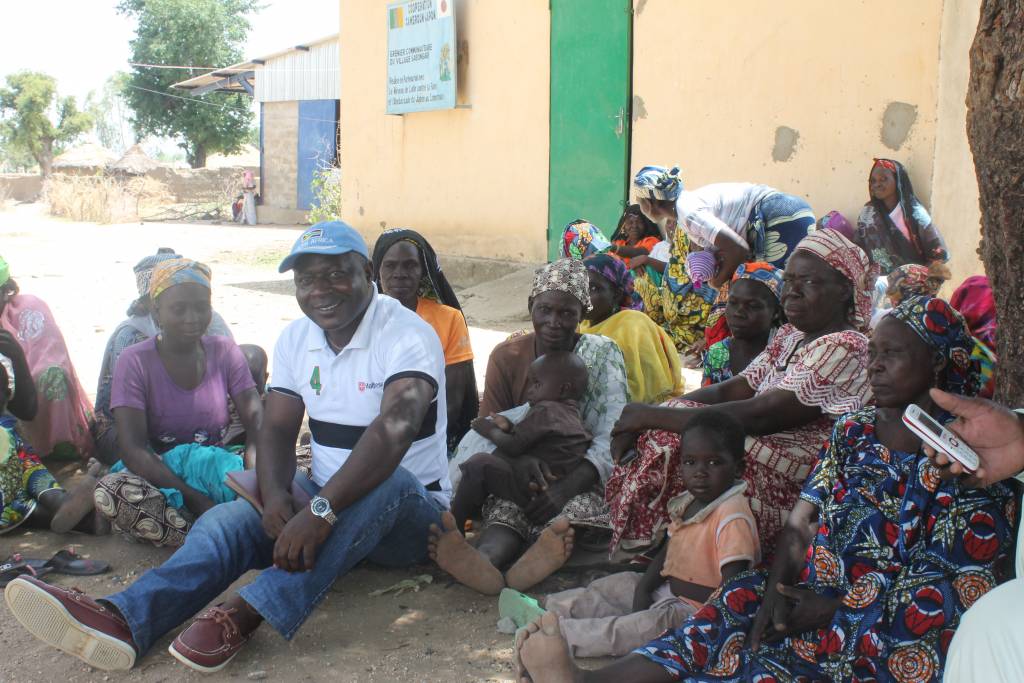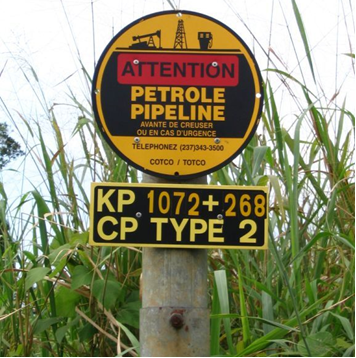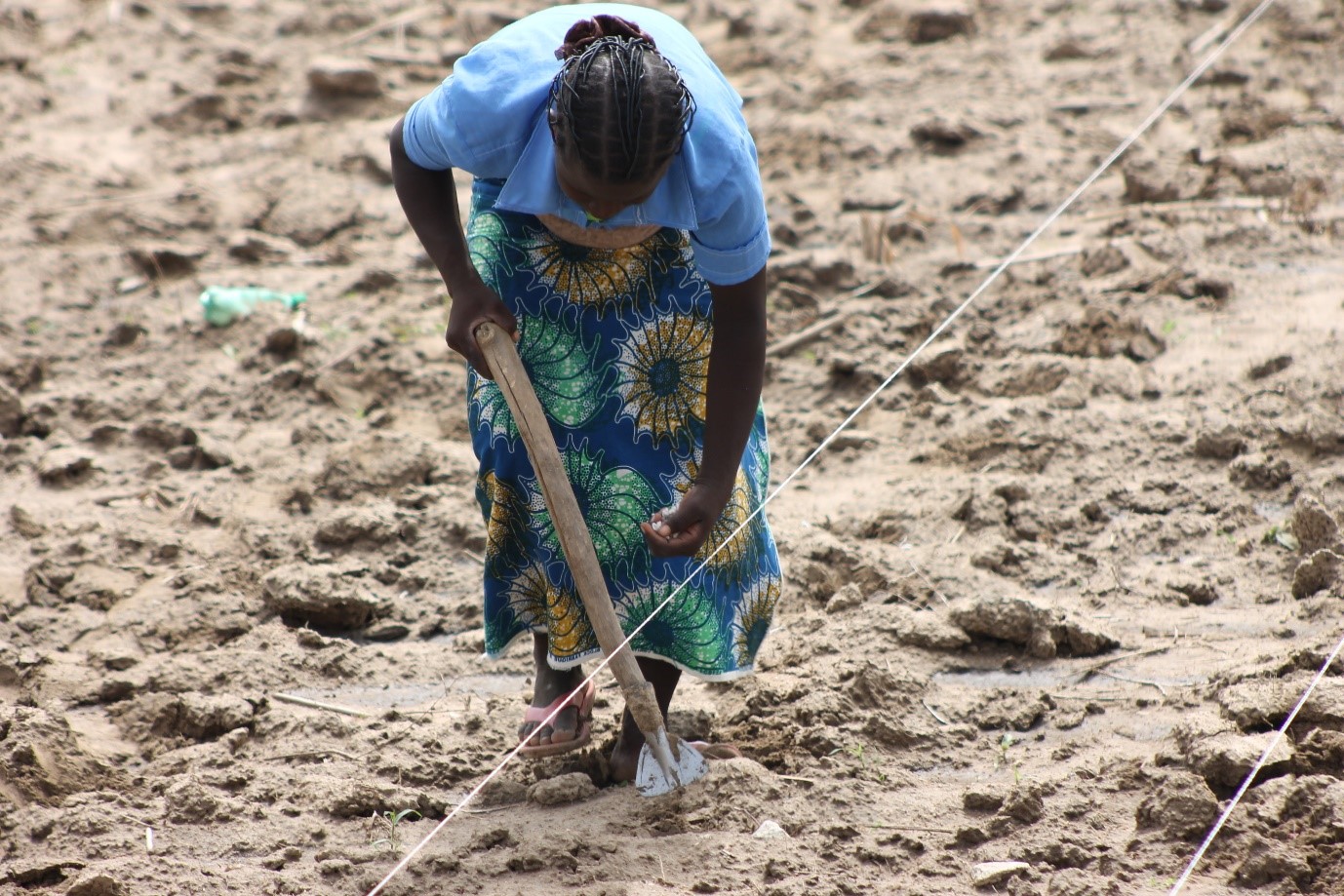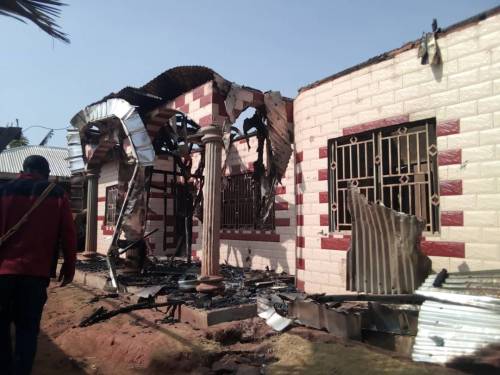Joining Hands Cameroon celebrates gains for communities
By Jaff Bamenjo | RELUFA

Jaff Bamenjo sits with women community members of RELUFA grain bank in Manyo Tsanaga division Far North region of Cameroon. Photo by RELUFA 2016
In September 2009, I joined RELUFA, the Joining Hands network in Cameroon, as an intern after finishing my master’s degree in development at the Institute of Social Studies in The Hague, Netherlands. As a young Cameroonian graduate, I came back home with a lot of enthusiasm to contribute to the development of my country.
Valery Nodem, the then Coordinator of RELUFA, hired me to work for three months on issues affecting communities along the Chad Cameroon oil pipeline route. It was serendipitous that my research work at the University was on NGO Advocacy Campaigns on the Chad Cameroon oil pipeline.
In three months, I visited numerous villages and communities along the 1070 km long pipeline, from the Atlantic Coast of Cameroon to Chad, studying the impacts of the pipeline on communities. This was my first exposure to these communities and these issues up close.
I analyzed laws and policies and identified the gaps. I monitored oil and gas companies and their level of compliance. I also followed developments in the Extractive Industry Transparency Initiative (EITI) and participated in Publish What You Pay events.

Large-scale development projects are pushing Pygmy peoples out of the forests on which they depend for their livelihoods. Photo by Emile (2017), RELUFA.
After witnessing directly the problems impacting communities, particularly indigenous forest people negatively impacted by large extractive and forest exploitation projects, I became very engaged with social justice issues – I discovered a huge contrast between the poor living conditions of the indigenous people compared to the immense revenues generated by companies initiating projects on their lands. This was unacceptable to me. The more I was exposed to these struggles, the more my thirst for justice grew along with the belief that I could influence change.
After my internship was over, I was offered a permanent staff position with RELUFA. From 2010 to 2011, I continued working with dedication on oil, gas and mining issues. In 2011, I replaced Valery Nodem as the Coordinator of RELUFA when he took a position with the Presbyterian Hunger Program. It is clear that I am now in this work for the long journey. On that journey, we have had some successes and some challenges.
Some of our successes
RELUFA has advocated for the fair treatment and compensation of communities affected by mining and oil and gas exploitation, and corporate land grabs. We have also worked to promote food sovereignty.
Transparency in extractive industries and accompaniment of affected communities
RELUFA has been actively engaged in conducting advocacy campaigns for the improvement of laws and policies governing the exploitation and management of natural resources in Cameroon. We participated in discussions to revise the mining law in Cameroon. RELUFA’s advocacy resulted in
the insertion of a clause into the revised mining law on the allocation of benefits to communities affected by mining. We continue to advocate for the effective implementation of the provisions of the law.
We produced a documentary and photo book on the Chad Cameroon oil pipeline that was used to pressure COTCO, the ExxonMobil subsidiary company in Cameroon, to join affected communities at the negotiation table. RELUFA coached communities to defend their interests. After prolonged negotiations, COTCO compensated affected communities for lost lands and livelihoods. Our work on the Chad-Cameroon pipeline project gave us the courage and tools to raise questions and come up with proposals on improving transparency and the management of the extractive industry sector in Cameroon.
Fighting land grabbing and ensuring access to land for poor farmers
Land grabbing is another area where despite many challenges, RELUFA has, in partnership with local communities and other civil society organizations, obtained some specific results. In May 2011, RELUFA, with some like minded partners, engaged a campaign against Herakles Farms, a New York based company that planned to develop a palm oil plantation on forested land in Cameroon. 14,000 people, mainly small farmers, were at risk of losing their land to the plantation. Local communities and civil society organizations mobilized and pressured the President of Cameroon to intervene in the land deal. The land concession was scaled down from a 99-year lease to a 3-year renewable lease and the scale of the project was reduced from 76,000 hectares to 19,000 hectares. Most farmers are better off and can take better care of their families when they own or have access to land than when they are laborers for food companies installed in the country.

Nasako Besingi, a human rights defender in Cameroon, experienced violent threats and was imprisoned for his advocacy work on the injustices of the Herakles Farms land grab.
In 1998, Plantations Du Haut Penja, a French multinational fruit company, which has affiliations with the American Dole Food Company, destroyed the fields of around 34 small farmers after the government evicted them from their lands in the Littoral region of Cameroon. RELUFA, accompanied the affected farmers to obtain land to start growing fruits like pineapples and papaya that would then be dried and packaged for sale. The packaging of the dried fruits contained an advocacy message, “if you buy this fruit you support farmers who lost their land to a multinational company.” The objective of the project was to help the farmers generate revenue to sustain their livelihoods and advocate for fair compensation from the company for their loses. It also helped to raise awareness on continuous land grabbing happening in that region. For almost one decade, RELUFA accompanied farmers in their negotiations with the company which resulted in the company paying farmers compensation for their land dispossession. The dry fruit campaign sent a message to multinational companies that communities are organizing themselves and companies can no longer operate without accountability.
Ensuring food sovereignty for poor and marginalized communities
Since 2006, RELUFA has been initiating a community grain banks project in the Far North, Sahelian region of Cameroon, supporting 25,000 people with improved food security.
The grain banks have been key to reducing hunger in many villages in the Far North which is the most populated, poorest and least food secure region in the country. In 2005, RELUFA started working with communities to understand how to best respond to their needs while avoiding creating dependency and ensuring sustainability.
The community grain bank entails an allocation of 60 bags (220 pounds per bag) of grains to each village so that members of the community can borrow during the lean season and reimburse during the harvest period. Through such an arrangement, food is available throughout the year in the villages, so people are not subjected to inflated market prices during the lean season. As of today, almost 15 years after this project started, a total of 42community grain banks has been created and are operating in villages.
Current Challenges
Despite the many contributions that RELUFA has made over the years in fighting land grabbing, improving oil and mining sector governance and reducing hunger in Cameroon, the country is currently going through tough times. Eight out of the ten regions of Cameroon are experiencing diverse forms of conflict, including zones where RELUFA has been working with communities. These conflicts have made it difficult for RELUFA to conduct normal field activities while also making it difficult to advocate for changes in policies with government attention focused on wars it is fighting.
Since 2013, Boko Haram, the Islamic radical movement in Nigeria, has been terrorizing northern Cameroon, kidnapping people and stealing food from people’s farms. Their presence and terrorist activities have prompted the influx of refugees fleeing atrocities from Nigeria into northern Cameroon. Around 60,000 refugees and 100,000 internally displaced people are now in the Far North region. The current situation has aggravated food insecurity and hunger in the north of Cameroon and is placing pressures on food systems in the region, including RELUFA community grain banks, due to the sudden increase in the population.
And then, there is the conflict in the Anglophone regions which has resulted in over 600,000 internally displaced people, 39,000 refugees in Nigeria and the destruction of over 200 villages. One consequence of all of these conflicts is that hunger and poverty have increased. RELUFA has had to adapt its approach from addressing root causes of hunger to collaborating with humanitarian agencies to provide humanitarian assistance to those in need.
Looking Forward
In its 20 years of existence, RELUFA has gained recognition from the government, policy makers and is consulted in important policy discussions in Cameroon. RELUFA also works on different processes in Africa and has built connections with lots of international actors. This has come through sustained action and unveiling the realities of affected communities. Advocating and engaging with partners to support communities in their struggles will continue to define RELUFA’s engagement for social justice.
Advocacy campaigns are sometimes difficult to evaluate, but the small successes that RELUFA has obtained have had an impact on the lives of the local communities with whom these campaigns have been conducted. The existing conflicts in the country are major causes of hunger and poverty. RELUFA will continue to advocate for a negotiated solution to the ongoing conflicts in order to fight against hunger.
Joining Hands is an initiative of the Presbyterian Hunger Program. The work of the Presbyterian Hunger Program is possible thanks to your gifts to One Great Hour of Sharing.


